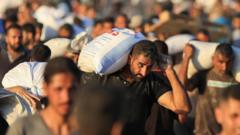Concerns are growing over the treatment of hostages held in Gaza, with leaders expressing outrage and demanding immediate action.
Leaders Urge Action Amid Alarming Hostage Conditions in Gaza

Leaders Urge Action Amid Alarming Hostage Conditions in Gaza
As video evidence reveals the dire state of Israeli hostages, international calls for humanitarian access intensify.
The ongoing conflict between Israel and Hamas has taken a grim turn as video footage of emaciated Israeli hostages emerged, prompting widespread condemnation from global leaders and urgent calls for humanitarian access. Over the weekend, protests erupted in Tel Aviv, highlighting public demand for the immediate release of hostages, including Rom Braslavski and Evyatar David, who are depicted in distressing conditions in recently released videos.
UK Foreign Secretary David Lammy condemned the videos as "sickening propaganda" and reiterated that hostages must be released unconditionally. The footage, which has drawn international attention, shows both Braslavski and David in alarmingly poor health after being taken captive during the Hamas attack on 7 October 2023, which resulted in 251 hostages initially being captured. Israeli officials, including Prime Minister Benjamin Netanyahu, have accused Hamas of intentionally starving the prisoners, while Hamas has vehemently denied these allegations, claiming hostages are provided with food equivalent to what is available in Gaza, amidst an ongoing hunger crisis.
Following the disturbing videos, Netanyahu reached out to the lead of the International Committee of the Red Cross (ICRC) in the region, seeking contributions of food and medical assistance to the hostages. The ICRC expressed its shock over the released footage, reinforcing its plea for access to evaluate the health and well-being of hostages and facilitate family contact.
Hamas's military wing, Al-Qassam Brigades, suggested conditional engagement with the Red Cross, contingent upon opening humanitarian corridors in Gaza and halting airstrikes during aid delivery. Meanwhile, criticism of the Red Cross’s effectiveness in aiding hostages has mounted, alongside criticisms from Palestinian perspectives regarding lack of access to prisoners in Israeli jails.
As debates over humanitarian responses continue, public protests in Tel Aviv aimed at securing the hostages' release have intensified. Families of the hostages are speaking out against the perceived negligence of Israeli leaders, highlighting fear for their loved ones' survival. Braslavski's family pleaded for intervention, stating he has been "forgotten," and highlighting alarming claims of neglect and mismanagement by authorities.
German Chancellor Friedrich Merz and French President Emmanuel Macron echoed these sentiments, deeming the images of hostages unacceptable and calling for action to facilitate their release as a critical step towards ceasefire negotiations. Macron also reiterated the necessity of political solutions leading towards a two-state framework, amidst rising humanitarian crises on the ground, including reports of malnutrition-related fatalities escalating daily among the Gazan population.
As the conflict draws in more international scrutiny and criticism over the humanitarian toll, the Israeli government faces increasing isolation, with public opinion shifting amid concerns for both Israeli hostages and the Palestinian populace suffering under dire conditions. The situation remains pivotal as calls for immediate aid and resolution grow louder amidst rising tensions in the region.
UK Foreign Secretary David Lammy condemned the videos as "sickening propaganda" and reiterated that hostages must be released unconditionally. The footage, which has drawn international attention, shows both Braslavski and David in alarmingly poor health after being taken captive during the Hamas attack on 7 October 2023, which resulted in 251 hostages initially being captured. Israeli officials, including Prime Minister Benjamin Netanyahu, have accused Hamas of intentionally starving the prisoners, while Hamas has vehemently denied these allegations, claiming hostages are provided with food equivalent to what is available in Gaza, amidst an ongoing hunger crisis.
Following the disturbing videos, Netanyahu reached out to the lead of the International Committee of the Red Cross (ICRC) in the region, seeking contributions of food and medical assistance to the hostages. The ICRC expressed its shock over the released footage, reinforcing its plea for access to evaluate the health and well-being of hostages and facilitate family contact.
Hamas's military wing, Al-Qassam Brigades, suggested conditional engagement with the Red Cross, contingent upon opening humanitarian corridors in Gaza and halting airstrikes during aid delivery. Meanwhile, criticism of the Red Cross’s effectiveness in aiding hostages has mounted, alongside criticisms from Palestinian perspectives regarding lack of access to prisoners in Israeli jails.
As debates over humanitarian responses continue, public protests in Tel Aviv aimed at securing the hostages' release have intensified. Families of the hostages are speaking out against the perceived negligence of Israeli leaders, highlighting fear for their loved ones' survival. Braslavski's family pleaded for intervention, stating he has been "forgotten," and highlighting alarming claims of neglect and mismanagement by authorities.
German Chancellor Friedrich Merz and French President Emmanuel Macron echoed these sentiments, deeming the images of hostages unacceptable and calling for action to facilitate their release as a critical step towards ceasefire negotiations. Macron also reiterated the necessity of political solutions leading towards a two-state framework, amidst rising humanitarian crises on the ground, including reports of malnutrition-related fatalities escalating daily among the Gazan population.
As the conflict draws in more international scrutiny and criticism over the humanitarian toll, the Israeli government faces increasing isolation, with public opinion shifting amid concerns for both Israeli hostages and the Palestinian populace suffering under dire conditions. The situation remains pivotal as calls for immediate aid and resolution grow louder amidst rising tensions in the region.


















